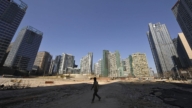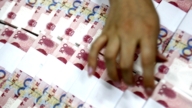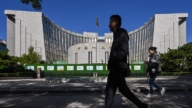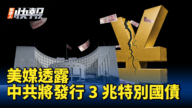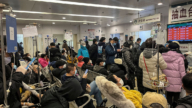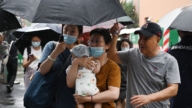【新唐人2014年02月01日訊】中共國家審計署日前公布全國政府性債務統計數據顯示,截至2013年6月底,中共政府的總體債務達30萬3千億元人民幣,佔GDP 53.3%﹔其中地方政府性債務攀升到17萬9千億元人民幣。那麼中國地方政府債務風險到底有多大?地方政府性債務總體風險是否像中共所說在「可控」範圍?所謂「國企私有化」真能解決地方政府債務嗎?我們聽聽專家的分析。
去年12月30號,中共國家審計署發佈2013年第32號公告,截至2013年6月底,全中國從中央到鄉鎮五級政府性債務總額中,中央和地方政府性債務總額30萬2700億元,負有償還責任的債務約20萬7千億元,負有擔保責任的債務2萬9300億元,可能承擔一定救助責任的債務6萬6500億元。比兩年多以前統計的債務數字猛增67%。
北京《國情內參》期刊首席研究員鞏勝利:「2013年已經過去了,中國的國民生產總值,從31個省市提供的國民生產總值大概是61萬億人民幣,減去剛才說的總債務和要到期的,要償還的債務,這就知道了中國目前債務的一些問題。」
北京《國情內參》期刊首席研究員龔勝利表示,按照美國、歐盟等國家制定的規則,債務不能超過國民生產總值,而中國地方債務有的高得不可想像。
英國《路透社》1月27號報導說,全中國31個省和直轄市,有30個發佈了地方債務審計聲明,地方公共債務總額達3萬億美元。而中國最富裕的東部省份,是負債最多的。它的債務佔GDP比例達到79%。
另據審計署的抽查,36個地方政府中,截至2012年末,有9個省會城市本級政府負有償還責任的債務率超過100%,最高達189%,如果加上政府負有擔保責任的債務,債務率最高者達219.6%。
鞏勝利說,中國的南京、武漢、廣州3個城市目前債務最嚴峻,債務的總量都超過了國民生產GDP的總和。
鞏勝利:「南京方面比較嚴峻,大概接近200%,武漢大概超過150%,廣州大概超過了100%多一些。簡單的說,它這個城市花出去的錢,比它產出的GDP要高出很多,廣州大概超出了一半以上,這個情況從目前來看有加劇的可能.」
鞏勝利表示,產生這個結果,是由於中國還債和債務的生成連接、生長環境不暢通,國家也沒有政府的破產機制,出現狀況就是政府從中央銀行直接撥錢解決。
中共官方日前表示,中國政府的總體債務,約佔GDP53.3 %,仍然處於國際公認的60%的警戒線以下。地方政府性債務總體風險「可控」。
大陸金融分析師任中道表示,中共的GDP等各方面的數據,連總理李克強都說是不可靠的,因此不能用真正的市場經濟,來衡量中共政府。
任中道:「中國政府大家都知道它是一個流氓政權,那麼它的償債能力和還債意願都需要得到質疑。有些國際機構的一些學家或者是研究人員,也是用這個比例、不超過GDP比例的60%的比例來說話,但是,因為中共本質導致了不能這麼衡量。」
鞏勝利:「現在中國審計署說可以解決這些問題,但是,有一點中國政府的投資也好,花錢也好,由政府自己說了算。中國還有一個機制就是,政府是在黨的管理之下,只要黨組織同意了,那麼地方政府就可以當然的舉債。長期這種治理債務,那真的是很風險。」
1月24號,世界經濟論壇2014年「達沃斯年會」上,中共發改委副主任張曉強談到地方債問題時表示,中央政府債務佔GDP20%,地方政府佔40%,加起來60%。而在大力發展混合制經濟的情況下,政府可通過「地方國企私有化」這個方式,獲取還債資金。
任中道表示,這是給中共權貴開路,在轉嫁債務的同時,慢慢控制國有企業,使國有資產變成權貴的東西。
而鞏勝利則表示,如果不根本上改變中共體制,這些債務會像滾雪球一樣越滾越大。
採訪編輯/易如 後製/李勇
Is China’s Local Government Debt Risk Under Control?
China’s National Auditing Office (NAO) data shows that its total government debt reached 30.3 trillion yuan (US$5 trillion) as of June 2013.
It accounts for 53.3% of GDP.
The local government debt swelled to 17.9 trillion yuan
($2.95 trillion) out of the total.
How much of a risk is local government debt?
Will this be like what the government has claimed, “it is under control"?
Will the “state-owned enterprises privatization" solve the local debt problem?
Let’s take a look at what the experts say.
On 30th December, 2013, NAO issued notice 2013 No.32.
As of the of June 2013, above five-tier township-level regimes combined debt had reached 30.2 trillion yuan (US$ 5 trillion).
The liabilities debt is about 20.7 trillion yuan (US$ 3.4 trillion), the credit guaranteed debt is about 2.93 trillion yuan (US$ 480 billion), the government might repay 6.65 trillion yuan (US$ 1.1 trillion). The total debt is 67% higher than the debt occurred in 2010.
Gong Shengli, lead researcher of a financial magazine:2013 has passed.
China’s Gross National Product (GNP) was provided by 31 local regions totaling
about 61 trillion yuan ($US 10 trillion).
If we deduct the current total debt including debt expired soon, as well as the debt needed to be repaid,we can tell the real problem of the current debt.
Gong Shengli says that according to the US and EU’s rule,the debt should not exceed GNP, however,the debt in some local governments in China is tremendously high.
On Jan. 27, UK Reuters reported that audit statements from 30 of China’s 31 local regions showed that their total debt had reached $3 trillion.
The wealthiest eastern provinces are the most indebted, with
the ratio of debt to GDP being 79%.
NAO’s survey taken from 36 regions shows, as of the end of 2012, nine capital cities’local government bears the responsibility to repay the debt rate over 100%, up to 189% plus the guaranteed debt, where the debt ratio reached its highest of 219.6%.
Gong Shengli says that Nanjing, Wuhan and Guangdong are the worst, their total debt exceeded the GDP’s total.
Gong Shengli: Nanjiang is the most serious, which has exceeded 200%, Wuhan has exceeded 150%, Guangzhou has exceeded 100%.
To put in a simple way, they have spent far more than its GDP.From the current situation, it likely to get worse.
Gong says that the cause of this result is that the repayment of the debt and borrowing link within the system are unsmooth, there is no government bankruptcy system,when the problem occurs, the government will take money from the central bank.
The Chinese regime officially says that the total government debt accounts for 53.3%, it is in the secure range of the international margin of 60%.
So it claims the local government debt is “under control".
Ren Zhongdao, financial analyst in Mainland China says that according to China’s GDP data in various areas,even premier Li Keqiang’s words are not reliable.
Ren claims the Chinese Communist regime cannot make use of the real marketing economy.
Ren Zhongdao: People know that the Chinese regime is a rogue regime.Its repayment ability and the will of repayment need to be questioned.Some of the international experts also use this ratio of 60% as a judgment on China, however, the evil nature of Communist China tells us it doesn’t work.
Gong Shengli: Now NAO says the problem can be resolved.One point is that the government’s investment and spending are decided by the government itself.
China has another system being that the government is under the Communist Party’s control, as long as the party agrees, the local government can borrow.
The long-term of using such a way to manage the debt is a real risk.
On Jan. 24, in the meeting of the World Economic Forum in Davos, Chinese officials regarding local government said that central government debt accounts for 20% of GDP, local accounts for 40%, the total is of 60%.Under the vigorously developing economic situation, the government can obtain funds via state-owned local enterprises privatization.
Ren Zhongdao says that this is to pave a way for communist elite groups, while diverting the debt, they gradually control the state-own enterprises, so the state-owned assets will fall into the elites’pockets.
Gong Shengli says that without changing the root of the communist system, all this debt can become a snowball, getting bigger and bigger.
Interview & Edit/YiRu Post-Production/LiYong




